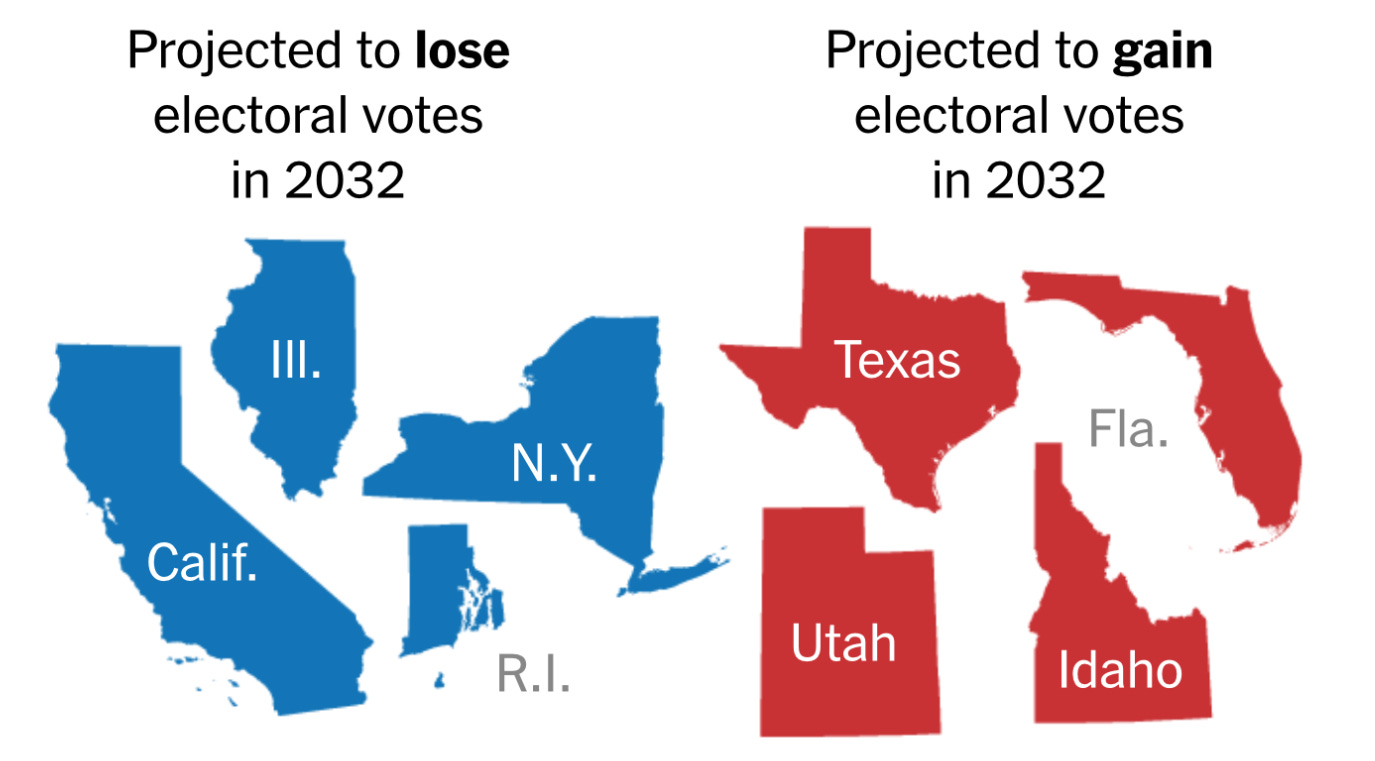California’s Power Grab Can’t Outrun the Census
Post-2030 population shifts could cost California three House seats—and with them, three electoral votes—boosting red states and reshaping national politics.
⏰ 4 minute read
Sacramento’s Redistricting Ruse Faces a Bigger Threat
California Democrats are scrambling for short-term power. Governor Gavin Newsom’s play: convince voters to scrap House lines drawn by an independent commission and instead create a net shift of ten more House seats in California for Democrats, calling it “fair representation.” Critics call it a naked power grab. The immediate stakes are real, but they overlook a bigger problem on the horizon. A New York Times analysis warns California’s influence is set to shrink, and it’s something we really can’t ignore.
A state’s Electoral College votes equal its number of House representatives plus its two senators. When states gain or lose House seats every decade due to population changes, their electoral votes shift, reshaping the path to the presidency.
Population Flight Slashes California’s Clout
The Times, citing Esri’s nonpartisan demographic data, projects a major realignment by 2032. Red states like Texas could gain three House seats, boosting electoral votes from 40 to 43; Florida adds two (30 to 32); Utah and Idaho each gain one (6 to 7 and 4 to 5). That’s a net plus-seven electoral votes for Republican strongholds. Meanwhile, blue states face losses: California could drop three House seats, cutting electoral votes from 54 to 51; New York one (28 to 27); Illinois two (19 to 17); Rhode Island one (4 to 3). Swing states like Pennsylvania and Minnesota may lose one seat each, trimming electoral votes to 18 and 9.
People are fleeing high-cost, over regulated states for places with lower taxes and better jobs. California’s population growth is projected to be minimal or flat, while Texas and Florida surge by about 11-13%. These aren’t just stats; they’re a direct slap at the policies—like soaring housing prices and excessive regulations—that are chasing people off.
Electoral Paths Narrow as House Seats Shift
Every lost House seat means a lost electoral vote—reshaping the presidential map. In 2024, Democrats had multiple routes to 270 through swing states like Arizona, Georgia, and Wisconsin. Post-2030, the Times estimates a third of those paths vanish. Of the 25 most plausible Democratic wins last year, only five hold up. A 2024 map splitting 212-219 for Republicans shifts to 205-226 in 2032. The Brennan Center predicts even bigger Republican gains from extra House seats in Texas and Florida.
For California, fewer House seats mean less sway in national races as red states amplify their electoral weight. It also means less clout in the Capitol - but maybe that’s a silver lining given the fact that California’s delegation is so left-wing!
Short-Term Maps vs. Long-Term Solutions
Newsom’s redistricting plan could grab a handful of House seats in the short run, but that’s no long-term solution. The real problem is why people leave: crushing costs and regulations that choke opportunity. Still, California’s leaders are fixated on tweaking maps rather than dealing with why everyone’s leaving. Redistricting tricks don’t keep families from moving vans. What we really need are policies to hold onto our residents, like cutting taxes and easing up on rules, instead of just messing with district lines.
So, Does It Matter?
This matters because losing House seats and electoral votes cuts California’s ability to shape federal policy, though frankly this may be the silver lining if you think that liberal policies are wrong for the country. While California will remain a reliable blue state in presidential elections, dropping from 54 to 51 electoral votes means winning here will be less decisive for electing a Democratic president, forcing reliance on tougher swing states. As red states gain seven electoral votes through added congressional seats, the national balance tips toward those prioritizing fiscal discipline and limited government.
For taxpayers, it’s a call to demand reforms that retain people and power in the Golden State. Keep playing games, and California’s power shifts to states that live within their means. The census clock is ticking.
Now for paid subscribers — a bonus below the firewall. The story of the original gerrymander. Did you know that Eldridge Gerry (whose name is in the term) was an original signer of the Declaration of Independence? Wait, I can’t give it away! See it below!
Take the plunge, become a paid subscriber - and take advantage of the huge discount available now. $5/mo or $50/year. Every week as free subscriber you will always get plenty of content. But between 30% - 40% of our best stuff is reserved for the paid tier. I did the math, and you end up spending around seven cents each time you get paid content. Now that is a deal…
Keep reading with a 7-day free trial
Subscribe to FlashReport Presents: So, Does It Matter? On CA Politics! to keep reading this post and get 7 days of free access to the full post archives.





